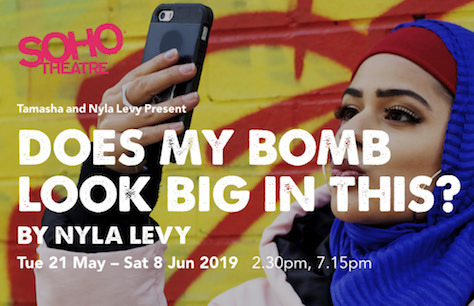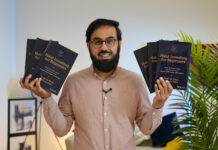The play “Does My Bomb Look Big In This” does not shy away from addressing dark and uncomfortable issues, writes Talha Ahsan.
Let’s take this as a rule: a play that purports to explain why a British schoolgirl would join ISIS should make the largely non-Muslim, white, well-to-do audience feel uncomfortable. These girls are NHS-born UK citizens who attended state schools under care of local services funded by our taxes. Nyla Levy’s comedy “Does my Bomb Look Big in This?” appears to embrace this with relish.
Yasmin Sheikh played by Nyla Levy, a south London pupil (Mitcham to be specific, that horribly racist neighbourhood in which I grew up for part of my childhood) is not present at her school’s GCSE results day. Best friend, Aisha played by the British Bangladeshi emerging talent Halema Hussain will explain to the audience why. Yasmin joins her as an avatar to dispute facts and interpretations. They are joined by Eleanor Williams, a well-spoken white female actor who plays all the undesirable roles such as Morgan, the school bully, the snooty shop assistant who wants the job-seeking Yasmin out of the store, and the part of a well-spoken white female actor who complains about her roles as unfair representations.
This is a quirky, meta-production where characters are suspicious and contemptuous of the audience, including calling out one member writing notes for this article.
Social not-working
This is very much a play about social media in the lives of the young. The blur of constant notifications and distractions is replicated vividly on stage. This is a production for eyes and ears habituated to rapid audio-visual movement and spaghetti-threads of online communications.
Besides the friendship of Yasmin and Aisha, one of the rare moments of tenderness in the play is between Jaffar, the French convert who marries Yasmin in Syria through an ISIS Tinder-like app. This could have been complicated with the introduction of Yazidi slave girls, but as so much is happening on stage perhaps its absence was not an oversight.
Subscribe to our newsletter and stay updated on the latest news and updates from around the Muslim world!
On the whole, we have lives devoid of trust whether that be a father that has never said “I love you” to his daughter, or teachers who report their pupils for poems criticising governments for bombing innocents abroad whilst underfunding healthcare for cancer patients.
Behind the scenes
Levy was compelled to create the play after experiences of being cast for one dimensional roles as ISIS brides or a terrorist’s girlfriend. The Leeds university graduate, who is of mixed Pakistani Muslim and Canadian Jewish parentage, spoke to Tasnime Akunjee, the family lawyer of Shamina Begum, for research on ISIS grooming techniques. She has said in an interview that though not religious herself, she experienced anti-Muslim bullying growing up.
The play does avoid the good Muslim/ bad Muslim dichotomy. Neither Aisha nor Yasmin would be seen as overtly “practising” Muslims. Like any young person, they try to negotiate a sense of belonging and purpose in a volatile world. No longer “Pakis” of their parents’ generation, now they are “PREVENTable” radical Muslims of today’s era of rolling news and Patreon-funded YouTubers.
More could have been said about the enculturation of certain brands of Islam. Under the influence of ISIS propaganda shared easily via WhatsApp groups, Yasmin grieving over her mother’s death becomes increasingly enthralled with the nasheed-laden videos as part of returning to her culture. Exasperated Aisha points out a language she does not understand cannot be her culture. Perhaps more accurately, a ghetto youth in this phase would more likely claim he isn’t following any culture but “Pure Islam”. Basically, that just means your culture is deracinated capitalist consumerism with some superficial trappings of the early modern Najd.
Final take…
Perhaps the message in this play for anyone inclined to join ISIS – though at the time of writing nothing remains of their so-called caliphate that once dominated an area the size of Great Britain – it is that your actions will bring your friends left behind into great problems with the police and authorities. In turn, your friends will despise you for it and disown you. It is this division in the ranks that the infidels seek.
The play is raucously funny. There are plenty of Asian Muslim in-jokes worthy of Goodness Gracious Me, such as that crushing disappointment of stumbling across ice cream tubs in the freezer only to find them filled with curry. It is equally wrenching in places which is a testimony to the quality of acting. There is the risk though, that in trying to imitate working class teenagers, one indulges in something akin to coonery. To be fair, there is only 10% cringe in their otherwise compelling performance.
The final optimism feels misplaced. The writer takes a swipe at #AllLivesMatter liberal platitudes. The audience are also reminded how the constant umbrage of the controversial PREVENT strategy inhibits the free expression of Muslim pupils. However, redemption feels too easy for the forces she has scorned throughout responsible for creating a climate which makes troubled young people easy pickings for cannon fodder ideologies.
The play’s success is the message there shouldn’t be a need for this play. One leaves feeling more representations like this of other people’s lives can be voyeurism and fetishism of lonely, unheard adolescents. The play appears to advocate that young minds, who never considered theatre as a space for them, should launch an invasion of the stage. I suspect any young Muslim from an immigrant family who watches this play would be inspired to take up that call of duty.
‘Does My Bomb Look Big In This?’ is at Soho Theatre, London, from Tuesday 21 May to Saturday 8 June before touring.
Talha Ahsan is a freelance translator and tutor in classical Arabic. He hosts the Abbasid History podcast and tweets at @talhaahsanesq.




















